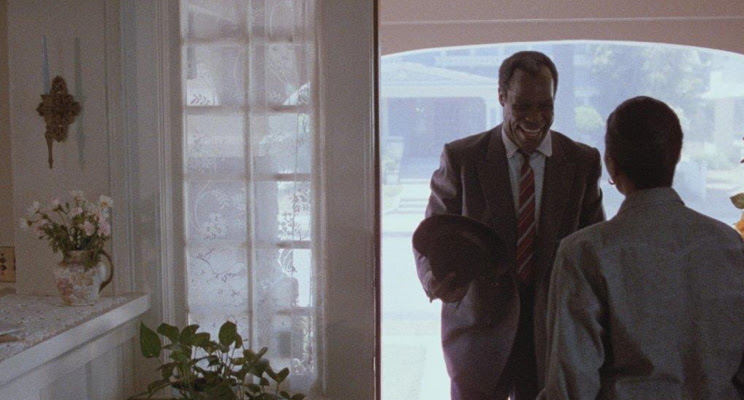One of the most original films from the 1990’s, unfortunately somewhat forgotten by the masses in history, is seeing a new digital restoration this autumn along with a week-long exclusive engagement this September at the Film Society of Lincoln Center in New York City.
Charles Burnett‘s To Sleep With Anger debuted on the silver screen in 1990 with a stellar cast of veteran stage and screen actors and a down-home charm and understanding of the issues affecting a then (though it still stands up now) contemporary Black American family. Danny Glover stars as Harry Mention, a mysterious drifter from the South who visits his old acquaintance Gideon (Paul Butler), now leading a middle-class life with his family in South Central Los Angeles. While on the surface Harry maintains traditional manners and sensibilities, his penchant for mischief quickly creates powerful rifts throughout the family. Is Harry the devil? Anallegory of the trickster? Not ever question is answered by film’s end, but you will experience rich wit, introspection, and entertainment.
Burnett’s overlooked masterpiece, and his first studio film, is full of imagination and deep characterization, female characters with agency, and strong supporting players to carry through the rich drama.

One can juxtapose Anger with Jungle Fever (released in 1991) and its meditation on the state of the American family – presented through a new, family-breaking interracial relationship – Burnett’s film stands stronger than Spike Lee’s fifth picture, through time and storytelling techniques. To personalize it, as I watched it on video as a 16-year old in 1991, Anger changed the way I viewed not only film storytelling, but African diasporic storytelling, especially those that also deal with the subtleties of traditional superstitions and the myths – and relative truths – created around them. As a grown man, the family in the film is actually a lot like my own. But moreso, in stark reality, the film is one of the main reasons I do the work in film that I do today.
Anger’s cast is also a treat. Beyond Danny Glover in one of his best performances ever during the prime of his career, and the always thorough and realistic Paul Butler, storied actress Mary Alice, just after her stint on NBC’s A Different World, plays the film’s matriarch Suzie. Carl Lumbly of TV’s Cagney & Lacey and Richard Brooks just before his turn in Law & Order, play Gideon and Suzie’s sons, polar opposites both trying to raise young children in South Central while learning still how to be men themselves; Vonetta McGee, well-known movie actress for Blacula and The Eiger Section, imitates art with life playing the movie wife of real life beau Lumbly, while Sheryl Lee Ralph, in the middle of her growing film and television career, plays the youngest son’s buppie wife Linda. Supporting actors Ethel Ayler (The Cosby Show), Julius Harris (Super Fly) and Davis Roberts (The Sophisticated Gents; Roots) round out the taut cast.


Charles Burnett became known to world cinema when his 1978 UCLA thesis film, Killer of Sheep, won the Critics’ Prize at the 1981 Berlin Film Festival. He is also one of the legendary filmmakers of UCLA film school’s L.A. Rebellion film movement of Black student filmmakers whose work was largely stigmatized, and who banded together to ensure their art would come to fruition. No, Burnett has never been a household name, but among cinephiles he is revered twice over.
The last time I saw the film was in 2011 at a Burnett retrospective at the MoMA, which is the first time I viewed it in a full theatrical setting. The print was one of less than a handful of remaining ones (if I’m not mistaken, it was found in a European vault) with a scratchy at-times audio track that left a lot to be desired. I already knew the film almost word for word, and sonically as well, so while obtrusive, I was just glad to see it and Burnett in person.
The restored version of To Sleep With Anger, made from the original negative, will play from September 9-15th at Lincoln Center. Burnett will appear in person for opening weekend and will also present a special screening of The Glass Shield (1994), a powerful indictment of the racist power structure of the LAPD, starring Ice Cube as a man wrongfully convicted of murder. For more details, stay tuned to Bold As Love Magazine and visit filmlinc.org.
Related Links
- UCLA Archive on “To Sleep With Anger”
- Charles Burnett biography & filmography – UCLA
- Richard Brody of The New Yorker on “To Sleep With Anger”
- original “To Sleep With Anger” NY Times review

